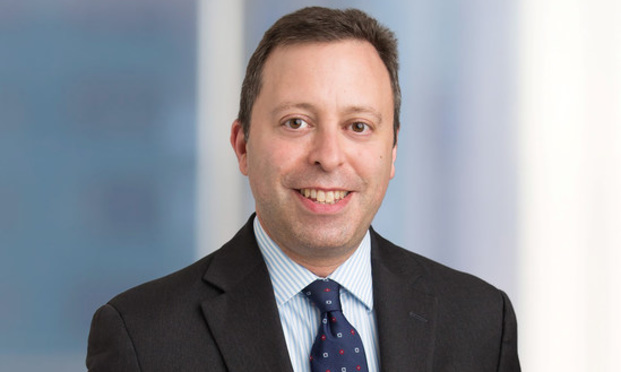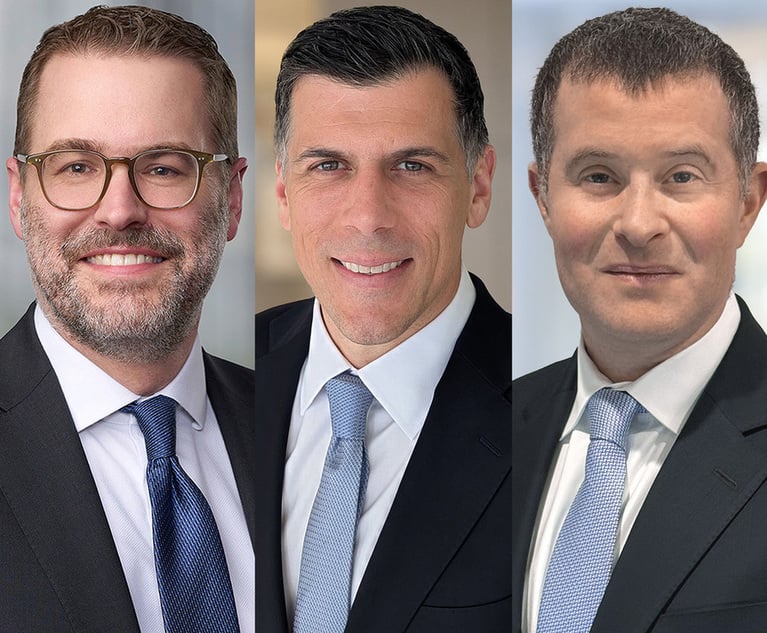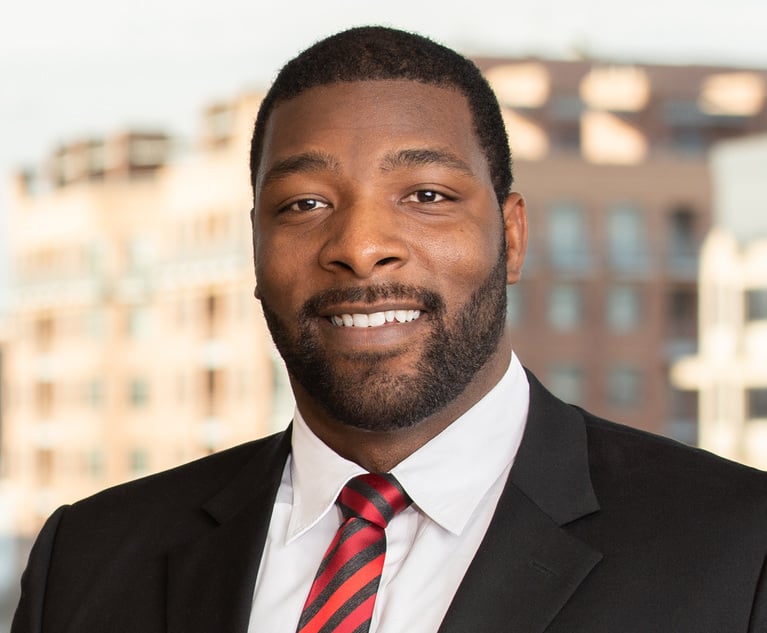Proskauer Rose
Pro bono work enables us to make a difference while gaining valuable legal and life experience.
April 30, 2019 at 11:59 PM
3 minute read
 William Silverman, with Proskauer Rose.
William Silverman, with Proskauer Rose.
Describe your firm's philosophy on pro bono service.
Our commitment to pro bono is part of who we are and is featured on our Proskauer For Good blog. Pro bono work is encouraged and valued. We prioritize work that promotes equal access to justice, such as securing immigration status for undocumented immigrants, legal protection for survivors of human trafficking, government benefits for veterans with disabilities, and healthy housing for low-income tenants.
Of the big cases your firm recently worked on, one included representing New Yorkers in a class action lawsuit in New York City Housing Authority apartments. Tell us more about that case and how you reached the outcome.
150,000 NYCHA residents, including 35,000 children, live in "asthma hotspots" generating the highest rates of asthma-related ER visits in NYC. We worked with the special master (appointed in 2016 to oversee compliance with the consent decree settling the lawsuit) to rewrite NYCHA's manual on mold abatement procedures, develop a novel software application to help NYCHA staff diagnose mold problems correctly, and implement a "Mold Busters" program. By January 2018, NYCHA claimed to be complying with the consent decree but tenants continued reporting recurrent problems. We hired a forensic data analyst who uncovered errors in NYCHA's quarterly compliance reports, proving that NYCHA was not in compliance. In February 2018, NYCHA announced it would not launch the Mold Busters program NYCHA-wide until 2020. We moved for an amended consent decree that the court approved, tightening NYCHA's obligations to repair mold/moisture quickly.
What was the most satisfying aspect of that key case?
Baez v. NYCHA is a case study in designing and implementing a novel methodology for addressing an environmental health crisis in public housing. It illustrates the challenges of reforming a large institution through litigation and the importance of forming coalitions of advocates and experts to press upon various levels of power—the courts, the government, the media and the public—to fight for racial and environmental justice creating systemic change.
Discuss other key pro bono matters recently completed by the firm.
In Martin v. Gross, the District of Massachusetts granted summary judgment in favor of our clients, finding the Massachusetts Wiretap Statute unconstitutional when applied to secret recordings of government officials performing their duties in public. The decision is significant for its clarification of protections under the First Amendment. In a landmark ruling for our client, a nonprofit providing residential and vocational opportunities to autistic individuals, the New Jersey Appellate Division ruled that New Jersey Law Against Discrimination protects the autism nonprofit in a land dispute. The unanimous ruling held that while the owners of the property might not fall into a protected class, they represent people who do.
Why does your pro bono work matter to you as a lawyer?
There is a tremendous unmet need for legal services among people of limited means. Pro bono work enables us to make a difference while gaining valuable legal and life experience. We became lawyers because values like justice, equality and fairness matter to us. Pro bono work enables us to apply those abstract principles to our communities and the lives of real people, which is both vitally important and enormously gratifying.
Responses submitted by William Silverman, a partner at Proskauer Rose who leads the firm's global pro bono efforts, and Erin Meyer, pro bono counsel at the firm.
This content has been archived. It is available through our partners, LexisNexis® and Bloomberg Law.
To view this content, please continue to their sites.
Not a Lexis Subscriber?
Subscribe Now
Not a Bloomberg Law Subscriber?
Subscribe Now
NOT FOR REPRINT
© 2025 ALM Global, LLC, All Rights Reserved. Request academic re-use from www.copyright.com. All other uses, submit a request to [email protected]. For more information visit Asset & Logo Licensing.
You Might Like
View All
Wilmer, White & Case, Crowell Among the Latest to Add DC Lateral Partners
4 minute read
Lawyers Across Political Spectrum Launch Public Interest Team to Litigate Against Antisemitism
4 minute read

Government Contracting Clients Look to Firms to Stay on Top of Trump Policy Changes
4 minute readTrending Stories
- 1Investor Sues in New York to Block $175M Bitcoin Merger
- 2Landlord Must Pay Prevailing Tenants' $21K Attorney Fees in Commercial Lease Dispute, Appellate Court Rules
- 3Compliance with EU AI Act Lags Behind As First Provisions Take Effect
- 4NJ's Pardons and Commutations A Model for the Federal System
- 5As Political Retribution Intensifies, Look to Navalny's Lawyers
Who Got The Work
J. Brugh Lower of Gibbons has entered an appearance for industrial equipment supplier Devco Corporation in a pending trademark infringement lawsuit. The suit, accusing the defendant of selling knock-off Graco products, was filed Dec. 18 in New Jersey District Court by Rivkin Radler on behalf of Graco Inc. and Graco Minnesota. The case, assigned to U.S. District Judge Zahid N. Quraishi, is 3:24-cv-11294, Graco Inc. et al v. Devco Corporation.
Who Got The Work
Rebecca Maller-Stein and Kent A. Yalowitz of Arnold & Porter Kaye Scholer have entered their appearances for Hanaco Venture Capital and its executives, Lior Prosor and David Frankel, in a pending securities lawsuit. The action, filed on Dec. 24 in New York Southern District Court by Zell, Aron & Co. on behalf of Goldeneye Advisors, accuses the defendants of negligently and fraudulently managing the plaintiff's $1 million investment. The case, assigned to U.S. District Judge Vernon S. Broderick, is 1:24-cv-09918, Goldeneye Advisors, LLC v. Hanaco Venture Capital, Ltd. et al.
Who Got The Work
Attorneys from A&O Shearman has stepped in as defense counsel for Toronto-Dominion Bank and other defendants in a pending securities class action. The suit, filed Dec. 11 in New York Southern District Court by Bleichmar Fonti & Auld, accuses the defendants of concealing the bank's 'pervasive' deficiencies in regards to its compliance with the Bank Secrecy Act and the quality of its anti-money laundering controls. The case, assigned to U.S. District Judge Arun Subramanian, is 1:24-cv-09445, Gonzalez v. The Toronto-Dominion Bank et al.
Who Got The Work
Crown Castle International, a Pennsylvania company providing shared communications infrastructure, has turned to Luke D. Wolf of Gordon Rees Scully Mansukhani to fend off a pending breach-of-contract lawsuit. The court action, filed Nov. 25 in Michigan Eastern District Court by Hooper Hathaway PC on behalf of The Town Residences LLC, accuses Crown Castle of failing to transfer approximately $30,000 in utility payments from T-Mobile in breach of a roof-top lease and assignment agreement. The case, assigned to U.S. District Judge Susan K. Declercq, is 2:24-cv-13131, The Town Residences LLC v. T-Mobile US, Inc. et al.
Who Got The Work
Wilfred P. Coronato and Daniel M. Schwartz of McCarter & English have stepped in as defense counsel to Electrolux Home Products Inc. in a pending product liability lawsuit. The court action, filed Nov. 26 in New York Eastern District Court by Poulos Lopiccolo PC and Nagel Rice LLP on behalf of David Stern, alleges that the defendant's refrigerators’ drawers and shelving repeatedly break and fall apart within months after purchase. The case, assigned to U.S. District Judge Joan M. Azrack, is 2:24-cv-08204, Stern v. Electrolux Home Products, Inc.
Featured Firms
Law Offices of Gary Martin Hays & Associates, P.C.
(470) 294-1674
Law Offices of Mark E. Salomone
(857) 444-6468
Smith & Hassler
(713) 739-1250








